NIO and Other Chinese EV Stocks Are Getting Crushed. Tesla’s Not Doing So Hot Either.

A EP9 is seen at the NIO stand during during the 18th Central China International Auto Show
Getty Images
Shares of NIO, XPeng, and Li Auto fell dramatically in Wednesday trading, adding to recent investor pain. Electric vehicle stocks have been roiled by issues ranging from interest rate changes to microchip shortages. Today’s is due to a new reason.
NIO (ticker: NIO) shares fell almost 7%. XPeng (XPEV) stock dropped 8%. Li Auto (LI) shares fared the worst Wednesday, dropping almost 13%.
EV investors can’t use rotation out of highly valued technology stocks as an excuse, however. Recently, old economy value-oriented stocks have been outperforming tech as the global economy awakens from its Covid-induced coma. The Nasdaq Composite Index fell only 0.1%. The Russell 1000 Growth Index and the S&P 500 both closed up about 0.2%.
So what’s hurting Chinese EV stocks? Li Auto seems responsible, catalyzing the drop by announcing plans for a $750 convertible bond offering in what amounts to a capital raise. Convertible bonds, as their name suggests, convert into common stock under certain conditions, and investors don’t like to see their existing stakes diluted with new stock. It’s the reason most capital raises tend to drive stock prices down for a while.
A convertible bond can generate some stock selling pressure in yet another way. Convertible arbitrage traders will sell the stock of the issuer short and buy the convertible bond. That way they can lock in a relatively attractive bond yield and take the stock risk, embedded in a convertible, out of their return equation.
With Wednesday’s drop, NIO, XPeng, and Li stocks are down more than 20% on average this year. U.S. EV stocks aren’t doing so hot either. Lordstown Motors (RIDE) has tumbled 41% this year, while Workhorse Group (WKHS) has slumped 44%, and Nikola has dropped 19%. All three of those stock have had their own issues to deal with, such as negative research reports and contract losses.
And even Tesla (TSLA), which is down just 4.9% in 2021, has fallen 24% since peaking in January.
EV investors have dealt with a lot already in 2021. Higher interest rates, which make financing growth more expensive and reduce the value of future cash flows, hurt EV stocks. So has the chip shortage. NIO stock, for instance, dropped after it cut delivery guidance because of a lack of chips. Now the specter of more capital raises is shaking investor confidence a little more.
Write to [email protected]




